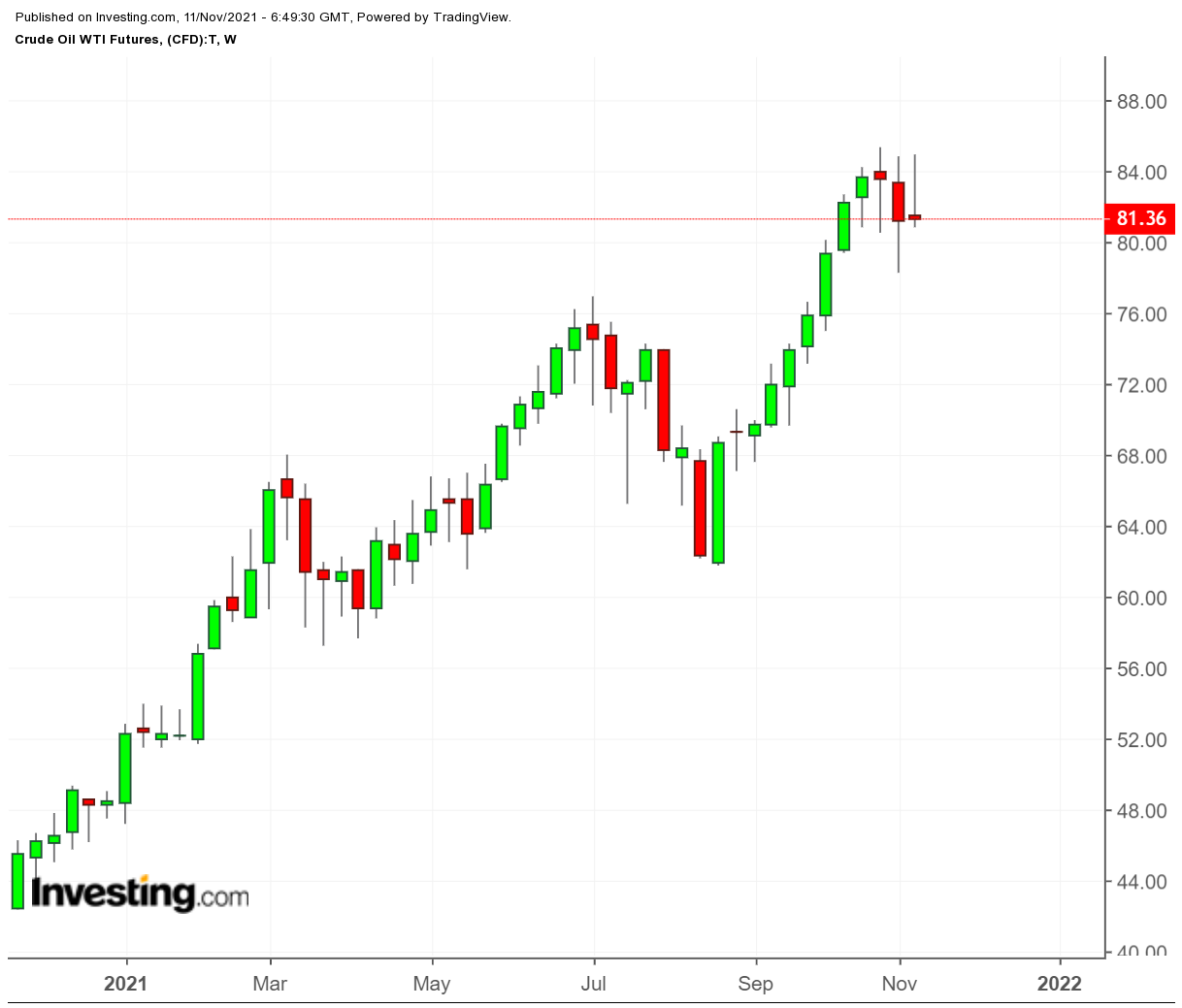The latest data from the Bureau of Labor Statistics in the U.S. showed that gasoline prices increased by 6.1% from September to October and are up by nearly 50% year-to-date. The Biden administration is aware of rising energy costs to U.S. consumers, but so far it has not shown any inclination to address the higher prices in a constructive manner.
In fact, there are no indications that the Biden White House will do anything effective to lower energy prices over the remaining three years of its term.
For traders, it is important to understand that the administration’s track record has suggested that it will likely be a force for higher prices, at least through January 2025. This does not mean that oil and other energy prices will necessarily rise, because there are other factors involved.

However, it does mean that one significant factor appears likely to continue pushing prices up.
Even before the 2020 election and inauguration, it seemed likely that a win by a Democrat, and a Biden administration, would become a force for higher oil prices. Almost immediately after the inauguration in January, 2021, the Biden White House set policies that indicated it wanted to limit domestic oil and gas production.
Early decisions, such as cancelling the Keystone XL Pipeline and putting a moratorium on federal onshore and offshore drilling leases, sent a message to the U.S. oil and gas industry that was taken seriously by producers. This has been made clear by the Dallas Fed Surveys since March of 2021.
However, it seems the situation for energy production in the U.S. is worse than some had forecast and could be further exacerbated. The price of WTI, the U.S. benchmark oil, is at its highest since 2014, but drilling is not rising as fast as many, including the EIA, expected. According to the latest weekly survey from the EIA, oil production in the U.S. remained steady at 11.5 million bpd, which reflects an increase of only 1 million bpd from this time last year and a still 1.6 million bpd less than pre-pandemic production levels.
At the same time, global oil demand has essentially recovered to pre-pandemic levels of about 100 million bpd. This imbalance, along with inflation and market speculation, is causing some of the highest gasoline and energy prices U.S. consumers have seen in years.
Lack Of Industry Comprehension And Global Forces At Play
No one really knows where the Biden administration’s energy policies are going, but the indications are not positive for domestic hydrocarbon production and transportation. After cancelling the permits for the Keystone XL Pipeline, many fear that the Biden administration could support Michigan governor Gretchen Whitmer’s attempt to shut down a key pipeline, called Enbridge Line 5, that transports crude oil, gasoline and other important energy products between Canada and the U.S.
(Note, the current U.S. Secretary of Energy, Jennifer Granholm, is the former Democrat governor of Michigan. More on her below). The Biden administration says it will negotiate this issue with Canada, but the White House has not provided real reassurance that it will support the continued operation of the pipeline. Shutting down Line 5 would make many energy products more expensive in the U.S.
Biden also shut down potential drilling in ANWR (the arctic) although it seemed like no companies were willing to take the risk to drill there anyway. The Green New Deal—or at least some aspects of it—remains an ever-present risk to the U.S. oil and gas industry, because many of the Biden administration’s allies support it. Just last week, the Administration announced it would soon be issuing new regulations about methane emissions and monitoring for oil and gas companies. However, since the rules have not been released yet, companies remain in the dark about what kinds of expenses they will face.
More recently, the domestic US oil and gas industry has had reason to be scared off by rhetoric from the administration and those close to the administration. First, Energy Secretary Granholm (Michigan's former governor as noted above) embarrassed herself and the Department of Energy by laughing when asked by a serious business TV host about her plan to address rising gasoline prices in the U.S.
She also conflated crude oil with the finished product of gasoline and demonstrated a lack of knowledge about the global oil industry by telling Sunday morning TV viewers that, “OPEC is a cartel, and it controls over 50% of the supply of gasoline.” Oil and gas companies in the U.S. have no reason to believe that the policymakers at the top in D.C. have any comprehension of their industry or the global market forces at play.
The Biden administration has continued to send anti-oil messages to U.S. producers, including by nominating Saule Omarova for Comptroller of the Currency. A video of her was recently discovered in which she said that smaller U.S. coal, oil and gas producers will “probably go bankrupt in short order. At least we want them to go bankrupt if we want to tackle climate change.” At the same time, President Biden and others in his administration have pushed for OPEC to increase oil production while actively hindering U.S. oil production.
These actions send the message to U.S. producers that the Biden administration does not understand their industry, nor does it care to do so. It wants many of them to fail and would prefer that U.S. consumers buy oil from foreign producers, except apparently not from Canada which is our neighbor and largest source of oil imports. American producers are being led to fear interruption or hinderance by the government.
The only reason the Biden administration might be compelled to change course is if gasoline and electricity prices rise too high and the administration fears a rebellion from voters (i.e., consumers). Otherwise, the oil industry has been given every reason to believe that the current administration is an obstacle to U.S. production.
